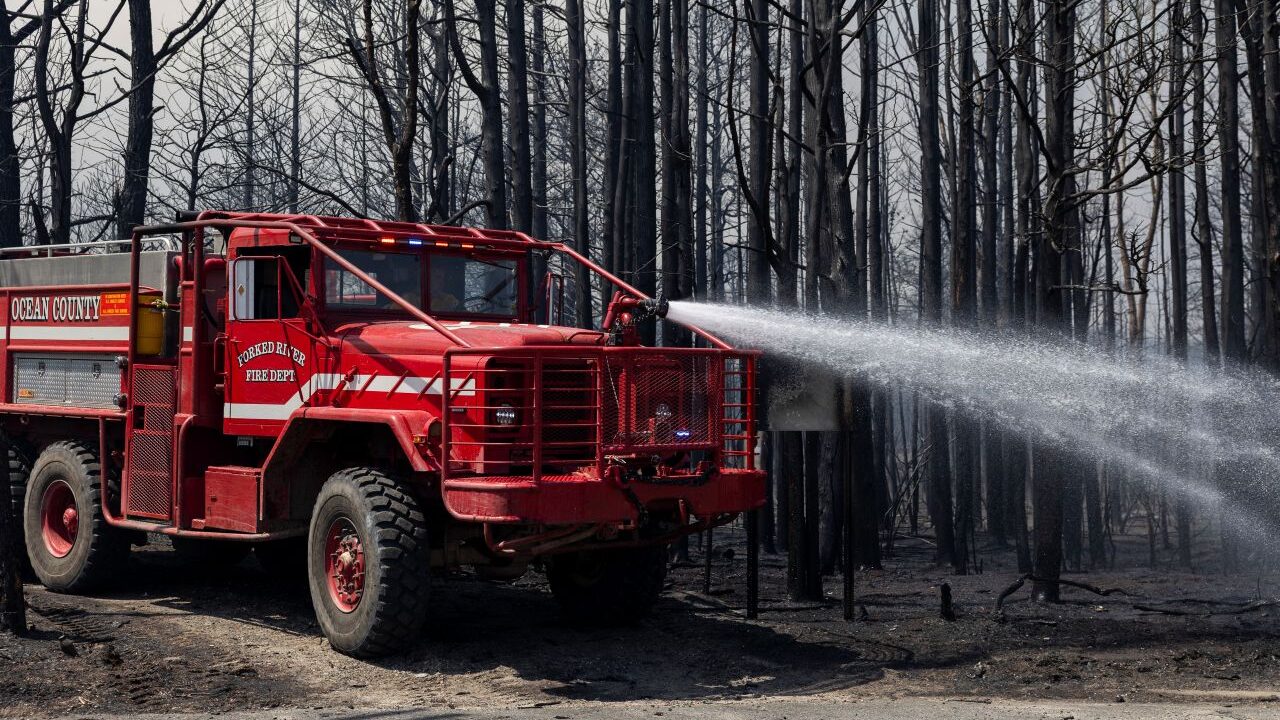A fire truck sprays down a burned area after a fire in the Pine Barrens in Lacey Township, N.J., April 23, 2025. Soaring prices for fire engines and yearslong wait times for delivery have strained local government budgets and placed communities in danger, firefighters told Congress on Wednesday, Sept. 10, 2025. (Rachel Wisniewski/The New York Times/File)

- Firefighters tell Congress about soaring fire engine costs and long wait times.
- “You’re stiffing your customers, and yet there’s nothing they can do about it. That is not a free market,” says Sen. Josh Hawley, R-Mo.
- One manufacturer testifies the industry is battling supply chain challenges, a labor shortage, and a flood of orders.
Share
|
Getting your Trinity Audio player ready...
|
Soaring prices for fire engines and yearslong wait times for delivery have strained local government budgets and placed communities in danger, firefighters told Congress on Wednesday.
Dennis Rubin, the fire chief in Kansas City, Kansas, said it appeared that “corporate greed” was to blame. In testimony, he called for Congress to intervene, suggesting that lawmakers pursue “enforceable manufacturing guidelines” on pricing, delivery times and how replacement parts are made available.
“There must come a day of reckoning when the manufacturers of our most important tools are held accountable for runaway pricing and extended delivery times,” he said.
The New York Times reported earlier this year that Wall Street executives have led an aggressive consolidation of the industry, cutting manufacturing lines and seeking to generate more profits from fire engine sales. Fire departments have seen prices jump in recent years. Order backlogs have grown, leaving departments waiting, sometimes for years, to replace rigs while struggling to find parts to keep older engines in service.
Many LA Fire Engines Out of Service During Wildfires
During the Los Angeles wildfires this year, many of the city’s fire engines were out of service, and officials there described struggles to replace rigs as a result of high costs and long wait times.
A bipartisan group of lawmakers is now demanding information from the manufacturers and asking for input from fire departments. On Wednesday, a Senate subcommittee focused on disaster preparedness held a hearing in which lawmakers criticized the industry’s practices and explored ways to hold manufacturers accountable.
Sen. Josh Hawley, R-Mo., the chair of the subcommittee, said people’s lives were being put in danger by prioritizing profits over supply. He said the committee wanted to know whether the leading manufacturers were colluding with each other on a business model that keeps rigs in short supply — something they denied.
“You’re stiffing your customers, and yet there’s nothing they can do about it,” Hawley told the manufacturers. “That is not a free market.”
One of the dominant fire engine manufacturers is REV Group, formed in 2010 by a private equity firm that sought to bring together a series of small specialty vehicle businesses. Company leaders said they hoped to create a streamlined industry that was more efficient and more profitable.
Manufacturer: Legitimate Reasons for High Costs, Delays
A senior REV Group executive, Mike Virnig, said fire engines are complex and customized vehicles that by their nature take a long time to produce. He said the industry had been strained by shortages in skilled labor, pandemic supply chain disruptions and the sudden availability of federal stimulus money that led governments to submit a flood of new orders for fire engine upgrades. He said the company last month broke ground on a major expansion of a South Dakota manufacturing facility.
“We work every single day to bring these backlogs down,” he said.
But Edward Kelly, head of the International Association of Fire Fighters, said that the industry’s consolidation had stifled competition.
Kelly said the strain had left cities more vulnerable. He described departments across the country struggling with aging fleets, and fire stations forced to operate without the fire trucks they need.
“These delays have absolutely had dangerous impacts on the safety of our neighbors, and the prices are crippling municipal budgets,” he said.
Kelly called on Congress to continue its oversight and to coordinate with the Federal Trade Commission and the Department of Justice.
This article originally appeared in The New York Times.
By Mike Baker/Rachel Wisniewski
c.2025 The New York Times Company
RELATED TOPICS:
Categories



















